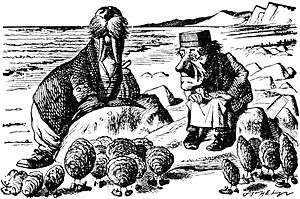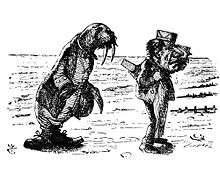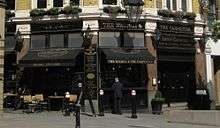The Walrus and the Carpenter

"The Walrus and the Carpenter" is a narrative poem by Lewis Carroll that appeared in his book Through the Looking-Glass, published in December 1871. The poem is recited in chapter four, by Tweedledum and Tweedledee to Alice. The poem is composed of 18 stanzas and contains 108 lines, in an alternation of iambic trimeters and iambic tetrameters. The rhyme scheme is ABCBDB, with masculine rhymes throughout. The rhyming and rhythmical scheme used, as well as some archaisms and syntactical turns, are those of the traditional English ballad.
Summary

The Walrus and the Carpenter are the eponymous characters in the poem, which is recited by Tweedledum and Tweedledee to Alice. Walking upon a beach one night when both sun and moon are visible, the Walrus and Carpenter come upon an offshore bed of oysters. Groups of four are called up; the exact number is unknown. To the disapproval of the eldest oyster, many more follow them. After walking along the beach (a point is made of the fact that the oysters are all neatly shod despite having no feet), the two main characters are revealed to be predatory and eat all of the oysters. After hearing the poem, the good-natured Alice attempts to determine which of the two leading characters might be the more sympathetic, but is thwarted by the twins' further interpretation:
"I like the Walrus best," said Alice, "because you see he was a little sorry for the poor oysters."
"He ate more than the Carpenter, though," said Tweedledee. "You see he held his handkerchief in front, so that the Carpenter couldn't count how many he took: contrariwise."
"That was mean!" Alice said indignantly. "Then I like the Carpenter best—if he didn't eat so many as the Walrus."
"But he ate as many as he could get," said Tweedledum.
This was a puzzler. After a pause, Alice began, "Well! They were both very unpleasant characters—"
Interpretations
The characters of the Walrus and the Carpenter have been interpreted many ways both in literary criticism and popular culture. Some, including the character Loki in the film Dogma, interpret the Walrus to be a caricature of the Buddha and the Carpenter to be a caricature of Jesus Christ.[1] British essayist J. B. Priestley argued that the figures were political,[2] as does Walter Russell Mead, who utilises the Walrus and the Carpenter as an allegory for Britain and the United States respectively.[3] However, in The Annotated Alice, Martin Gardner notes that, when Carroll gave the manuscript for Looking Glass to illustrator John Tenniel, he gave him the choice of drawing a carpenter, a butterfly, or a baronet, since each word would fit the poem's metre. Because Tenniel rather than Carroll chose the carpenter, the character's significance in the poem is probably not in his profession, and interpretations of the poem as a commentary on religion are likely false. Gardner cautions the reader that there is not always intended symbolism in the Alice books, which were made for the imagination of children and not the analysis of "mad people".
Other appearances

- In the 1934 Betty Boop short film Betty in Blunderland, the Carpenter is using a hammer on a saw with two lobsters and three clams and the Walrus is on a board eating fishes out of a fishbowl.
- In the Doctor Who episode, "Rings of Akhaten", the Doctor mentions "Shoes and ships and sealing-wax and cabbages and kings", when talking about things made by the stars.
- In the XKCD comic entitled, "Click and Drag", a character recites a version combining the poem with the Lord of The Rings trilogy, saying, ""The time has come', the Walrus said, and put on Sauron's ring."
- "The Walrus and the Carpenter" song is sung by Tweedledum and Tweedledee in the 1951 Disney film Alice in Wonderland with the moon and the sun on each side and the oysters. The Walrus is portrayed as an intelligent, but lazy conman, with the Carpenter as a hardworking, but dimwitted sidekick who needs beating with a cane for acting before thinking. All characters in the story are voiced by J. Pat O'Malley. After the Carpenter discovers a family of oysters underwater, the Walrus tries to persuade them to come "walk" with them. The Mother Oyster, on the other hand, knows that the current month is March, one of the 8 months with the letter "R" in which oysters are eaten. She tries to convince her children to stay in the sea, but the Walrus (refusing to take no for an answer) shuts her up (literally) and leads the dozen curious, younger oysters in a Pied Piper-like dance and flute solo ashore, where the Carpenter builds a restaurant from a shipwreck on the beach in six seconds. Once everyone is inside, the Walrus (who somehow doesn't want to share) tricks the Carpenter into preparing some food so that he can eat all the oysters himself (off screen). When the Carpenter returns to find every last oyster devoured and that the Walrus has tricked him, his face turns red with anger and he chases the Walrus outside with his hammer. In the final parts of the film, the Walrus and the Carpenter are among those who join the Queen of Hearts into chasing after Alice.
- A line from the poem was used by O. Henry for the title of his 1904 book Cabbages and Kings.
- Lines were used as clues in the Ellery Queen mystery story "The Adventure of the Mad Tea-Party".
- The surreal short story "The Sea was Wet as Wet Could Be" by Gahan Wilson, first published in Playboy in 1967, was inspired by the poem and includes large portions of it.
- In the Beatles song "I Am the Walrus", the walrus refers to the walrus in the book.[4] John Lennon later expressed dismay upon belatedly realising that the walrus was a villain in the poem.[5]
- In the play Journey's End by R. C. Sheriff, the character Osborne quotes the poem to Raleigh before going to the trenches.
- Harriet the Spy, a 1996 adaptation of the Louise Fitzhugh novel, shows lead character Harriet and her nanny (played by Rosie O'Donnell) reciting alternating lines of the poem to each other on multiple occasions.
- A line from the poem was used as the title of the book Why The Sea Is Boiling Hot: A Symposium On The Church And The World (Ryerson Press, 1965). It was a collection of essays by a group of leading literary and political writers concerning the place of the church in 1960s Canadian society, commissioned by the then-Board of Evangelism and Social Service of the United Church of Canada.
- The Jack Warden character "Doc" in the John Wayne and Lee Marvin film Donovan's Reef, quotes part of the poem to his visiting daughter from Boston, who looks down her society nose at the lifestyles of the people who live on the island.
- In "The Clocks" by Agatha Christie, Hercule Poirot quotes part of the poem to his visiting mentee, Colin Lamb, who is trying to find the importance of clocks found at a murder scene.
- The Lucy Maud Montgomery character "Anne" quotes the part of this poem when talking about things she might learn in college in the book Anne of the Island.
- In the Ultimate Muscle manga series the villainous wrestler and superman Neptuneman tells the tale to the good-natured Seiuchin (a walrus-themed hero and wrestler), driving him to embrace his own predatory nature and start displaying an egotistical streak.
- In the 1999 film Dogma, the Matt Damon character Loki tells a nun this story as his reason for becoming atheist.
- In Arthur C. Clarke's novel 2010: Odyssey Two, the poem is playfully quoted as "'The time has come,' said Dr. Dimitri Moisevitch to his old friend Heywood Floyd, 'to talk of many things. Of shoes and spaceships and sealing wax, but mostly of monoliths and malfunctioning computers.'" in reference to the events from 2001: A Space Odyssey.
- In Sandra Cisneros's novel The House on Mango Street, Esperanza recites the poem to Ruthie in the vignette "Edna's Ruthie."[6]
- In The Wild Wild West episode "The Night of the Underground Terror", James West briefly quotes from the poem when he first meets the episode's villain.
- The poem inspired the song "Just One Lifetime" by Sting and Shaggy off their album 44/876.
See also
References
- ↑ Richard W. Santana; Gregory Erickson (2008). Religion and Popular Culture: Rescripting the Sacred. McFarland. pp. 89, 103. ISBN 978-0-7864-3553-1.
- ↑ Priestley, J. B. (10 August 1957). "The Walrus and the Carpenter". New Statesman. p. 168.
- ↑ Mead, Walter Russell (2007). God and Gold. London: Atlantic Books. pp. 43–45. ISBN 978 1 84354 724 2.
As the poem opens, the Walrus and the Carpenter—who, we can suppose, allegorically and respectively represent Britain and the United States—have worked themselves into a typically Protestant and Anglo-Saxon froth of transcendental idealism.
- ↑ MacDonald, Ian (2005). Revolution in the Head: The Beatles' Records and the Sixties. Chicago, IL: Chicago Review Press. p. 268. ISBN 978-1-55652-733-3.
- ↑ Sheff, David (2000). All We Are Saying: The Last Major Interview with John Lennon and Yoko Ono. New York: St. Martin's Press. p. 185. ISBN 0-312-25464-4.
- ↑ Cisneros, Sandra (1997). The House on Mango Street. Jane Schaffer Publications. ISBN 9780679734772.
External links
| Wikisource has original text related to this article: |
- Text of "The Walrus and the Carpenter" (with illustrations)
- Audio – hear the poem
- Gardner, Martin (1999). The Annotated Alice: The Definitive Edition. W. W. Norton & Company. ISBN 0393048470.
